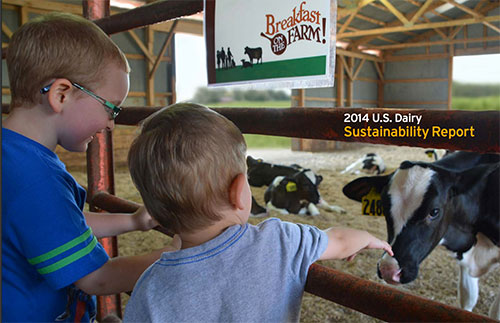
The Innovation Center for Dairy recently published the 2014 U.S. Dairy Sustainability Report and details the industry's efforts.
The 40-page report details progress and current initiatives. Producers and processors work diligently to ensure sustainable practices and to educate consumers about our people, products and plans.
Some key points and messages from that report:
• Since 1944, milk production has quadruped, but the industry uses 90 percent less cropland, consumes 65 percent less water and emits 63 percent fewer greenhouse gases.
Dairy farmers are producing more milk, more efficiently and using fewer resources. This has been possible with science, research and technology.
• The Center's objective is to build continued consumer confidence and trust in dairy. Scientific research provides information about where food comes from, how it's produced, as well as its nutrition.
Even the most wholesome of foods needs the support of consumers for long-term viability.
• Dairy producers and processors continually practice safe food-handling procedures and The Innovation Center leads a range of food safety workshops. The National Farmers Assuring Responsible Management (FARM) program now represents over 85 percent of the nation's milk supply and is dedicated to best practices for optimal animal care.
From the dairy farmer, to the processor to the parent who puts milk on the family's table, all have a vested interest in food safety.
• Since 1917, a scientific connection has been documented between dairy foods and good health. Milk, cheese and yogurt contribute just 10 percent of the calories in the U.S. diet. Improved bone health and reduced heart disease and type 2 diabetes are just three of dairy's many strengths.
For less than $1 per day, three servings of dairy provide nine essential nutrients in a healthy diet.
• Collaborations with food manufacturers and restaurants have helped drive dairy consumption. Added cheese and sour cream to menu options, promoting milk with oatmeal, making milk the default beverage for children's meals and the awareness of lactose-free cow milk have realized additional avenues and sales. Additionally, other partners have looked for ways to reduce sodium, fat and sugar in dairy products, while increasing protein, fiber and nutritional density. Domino's and Pizza Hut are in their development and testing of kid-friendly pizzas that are delivered fresh to schools.
No industry is an island. Food industry partnerships have seen great benefits.
The Center was established in 2008 through dairy farmer-funded Dairy Management Inc.

The author is the online media manager and is responsible for the website, webinars and social media. A graduate of Modesto Junior College and Fresno State, she was raised on a California dairy and frequently blogs on youth programs and consumer issues.
The Center was established in 2008 through dairy farmer-funded Dairy Management Inc.

The author is the online media manager and is responsible for the website, webinars and social media. A graduate of Modesto Junior College and Fresno State, she was raised on a California dairy and frequently blogs on youth programs and consumer issues.








